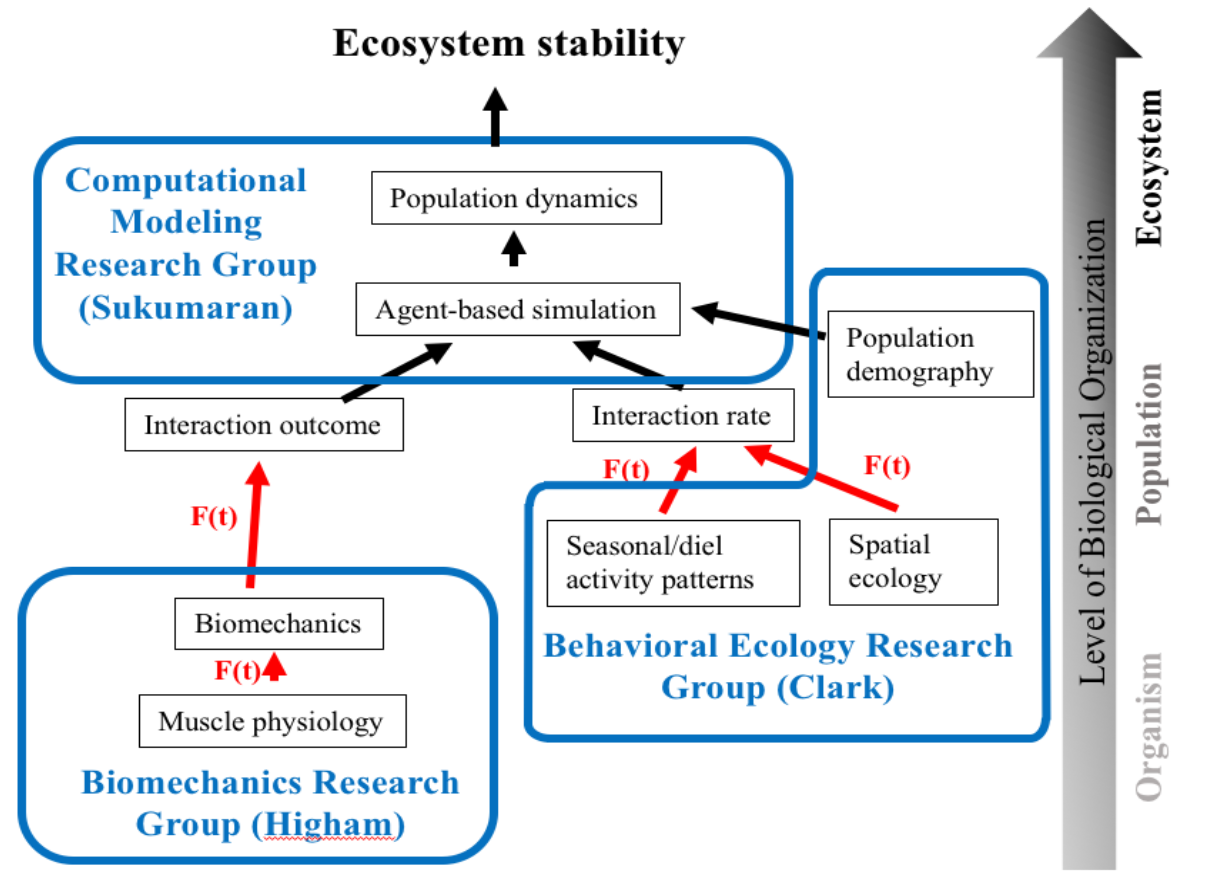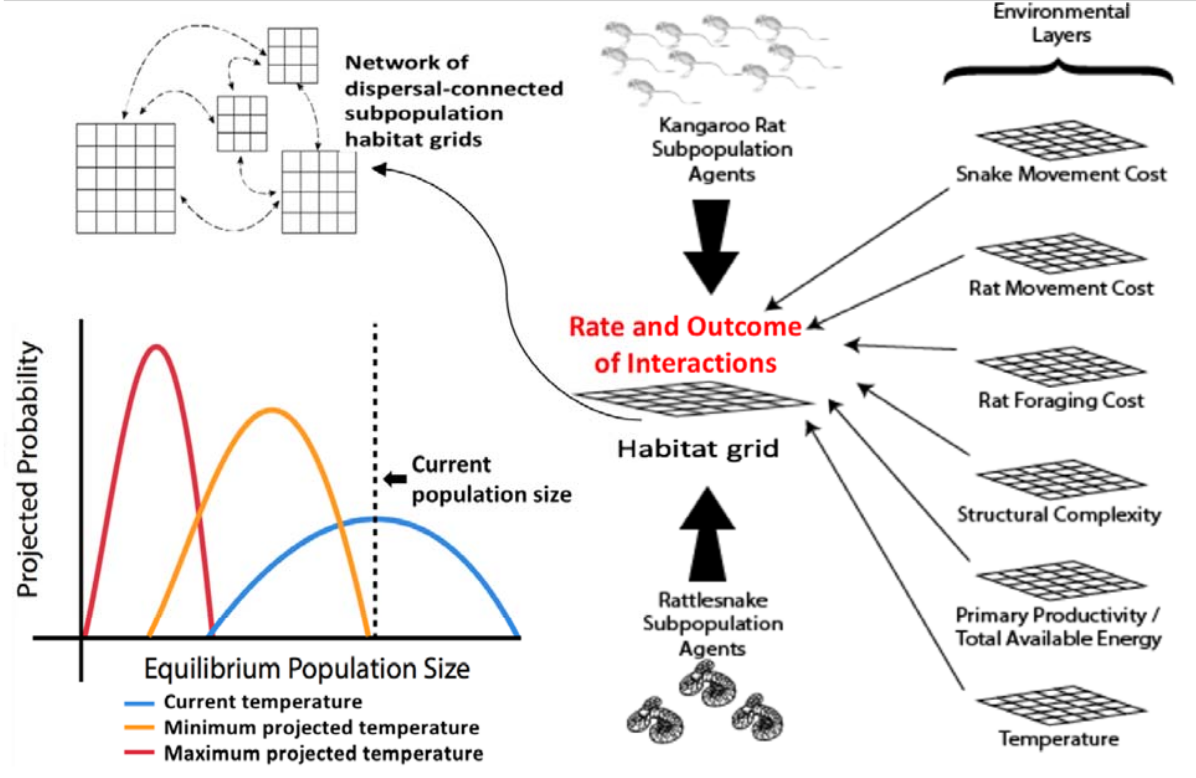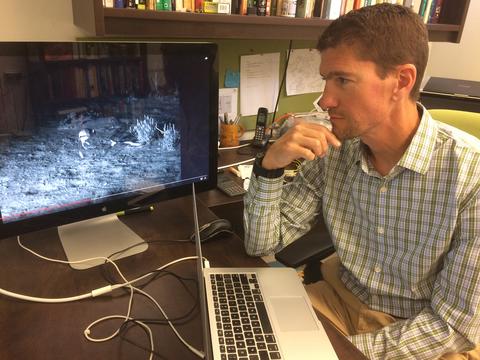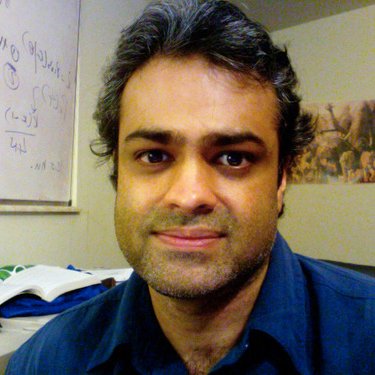About The Project
Our team is investigating how environmental temperature mediates predator-prey relationships between ectotherms and endotherms by focusing on interactions between kangaroo rats and rattlesnakes. Because ectothermic species are more likely to exhibit altered movement and performance in response to temperature changes, outcomes of species interactions involving an ectotherm and an endotherm may be directly mediated by temperature. Our work integrates approaches from multiple disciplines, including physiological ecology, biomechanics, behavioral ecology, population ecology, and computational modeling.


Doctoral Research Opportunities
We are seeking to recruit up to four new students coming in to our programs as an integrated team with complementary projects and specialties. These positions will be funded, with students receiving a stipend and full benefits. Team members would each individually lead different aspects of the project, but all members would be involved in all aspects, thus gaining expertise by teaching and learning about a diversity of methodological tools and conceptual approaches. We are seeking applicants with interest and experience in each of the following areas (with each area being led by a different mentor/investigator):
- Muscle physiology and biomechanics (working primarily with Dr. Tim Higham at UCR): focus on strike mechanics, three-dimensional predator-prey interactions, and skeletal muscle mechanics. The latter will involve both in vivo and in vitro experiments, with a focus on rattlesnake strikes.
- Behavioral and population ecology of vertebrates (working primarily with Dr. Rulon Clark at SDSU): focus on the use of field methods to quantify spatial ecology, activity cycles, predator and antipredator behaviors, and population demography of both rattlesnakes and kangaroo rats. Experience and/or interest in animal-borne accelerometry, radio telemetry, spatial capture-recapture, small mammal trapping, and handling/restraint of venomous snakes is desirable.
- Computational modeling, machine learning, and bioinformatics (working primarily with Dr. Jeet Sukumaran at SDSU): focus on developing computational spatially-explicit simulations of rattlesnake and kangaroo rate interactions, machine learning approaches to infer and predict behavior and population cycles.
How To Apply
Students interested in this opportunity should send a letter of inquiry to the potential mentor of interest:
- Dr. Tim Higham (thigham@ucr.edu)
- Dr. Rulon Clark (rclark@sdsu.edu)
- Dr. Jeet Sukumaran (jsukumaran@sdsu.edu)
The letter should consist of a one page statement describing your scientific background and relevant research experience and explaining why you are interested in the project. Please append a copy of your CV and a scientific writing sample to this statement. Writing samples can by previously published papers, project reports, class or laboratory assignments, grant proposals, or any other work that illustrates your proficiency with scientific inquiry and analysis. Students joining the team would receive full support packages through either the Joint Doctoral Program in Evolutionary Biology at SDSU, or the Evolution, Ecology, and Organismal Biology Graduate Program at UC Riverside. Please review program websites for details on application materials, deadlines, and support packages.
Interested applicants should submit letters of inquiry by October 25, 2019. Initial phone interviews with prospective applicants will then be arranged sometime between Nov 1 and Nov 15 (prior to doctoral program application deadlines). Competitive doctoral program applicants would then be invited to in-person interviews in the spring of 2020.
About the Team
Doctoral students will work with postdoctoral researchers, undergraduate research assistants, and MS graduate students as part of a multi-year project funded by the National Science Foundation. The team Principle Investigators are faculty at San Diego State University (SDSU) and UC Riverside (UCR):
 Dr. Tim Higham's laboratory focuses on the origin and evolution of innovations, integration, and complexity, with a strong emphasis on the ecological context of organismal function. To do this, they integrate comparative physiology, biomechanics, comparative evolutionary methods, genomics, and ecology. More details at the Higham Lab website.
Dr. Tim Higham's laboratory focuses on the origin and evolution of innovations, integration, and complexity, with a strong emphasis on the ecological context of organismal function. To do this, they integrate comparative physiology, biomechanics, comparative evolutionary methods, genomics, and ecology. More details at the Higham Lab website.
 Dr. Rulon Clark's laboratory group at San Diego State University studies behavioral and evolutionary ecology of animals, with a particular focus on venomous snakes and the things that they eat. The general approach in the Clark lab is to use novel field methodologies to study animals in their natural environments to quantify the mechanics and function of coevolved predator and antipredator behaviors. More details at the Clark Lab website.
Dr. Rulon Clark's laboratory group at San Diego State University studies behavioral and evolutionary ecology of animals, with a particular focus on venomous snakes and the things that they eat. The general approach in the Clark lab is to use novel field methodologies to study animals in their natural environments to quantify the mechanics and function of coevolved predator and antipredator behaviors. More details at the Clark Lab website.
 Dr. Jeet Sukumaran develops computational models to study how the processes of evolution generate, regulate, and maintain the patterns of life we observe across space and time on this planet. More information can be found on Jeet's research page.
Dr. Jeet Sukumaran develops computational models to study how the processes of evolution generate, regulate, and maintain the patterns of life we observe across space and time on this planet. More information can be found on Jeet's research page.